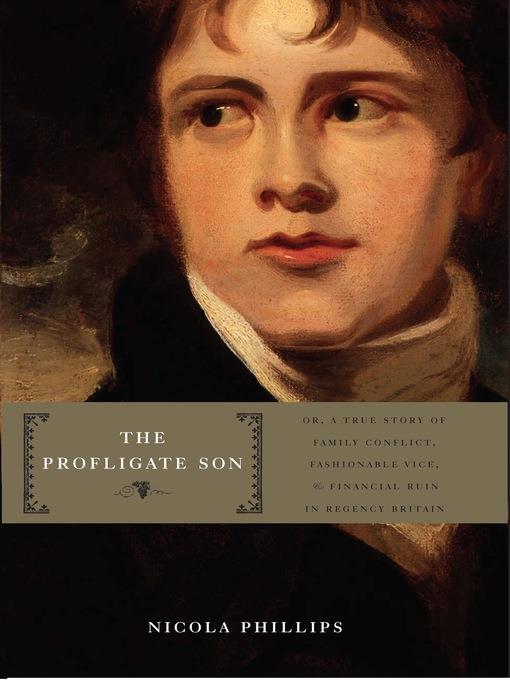
The Profligate Son
Or, A True Story of Family Conflict, Fashionable Vice, and Financial Ruin in Regency Britain
کتاب های مرتبط
- اطلاعات
- نقد و بررسی
- دیدگاه کاربران
نقد و بررسی

July 1, 2013
William Jackson “had once been the apple of his fond father’s eye,” yet at just 20 years old, he found himself in jail awaiting trial—and a possible death sentence—for forgery. Drawing on hundreds of letters, prison and court records, and William Jackson Sr.’s unpublished, self-serving account of his son’s downfall (Filial Ingratitude; Or, The Profligate Son), Phillips (Women in Business) draws a portrait of a tortured father-son relationship, likening it to the inflexible King George III’s critical rapport with his debt-saddled, voluptuary eldest son—which strained relationship many blame for the latter’s indiscretions. William Jr., for his part, frequented brothels, racked up enormous debts to acquire “all the essential accoutrements” of a fashionable gentleman, and at 18 was impelled to sell his military commission to get out of the red. In and out of debtors’ prisons and court at the Old Bailey, William seemed hell-bent on becoming the profligate son, a reprehensible “stock character” in the arts of the age. He succeeded faster than he could’ve imagined. This is an engrossing tale of a Regency rake’s fast times and tragic unraveling that vivifies the history of Georgian England and colonial Sydney, Australia. 14 b&w images and 2 maps. Agent: Peter Robinson, Rogers, Coleridge & White, U.K.

July 1, 2013
British academic Phillips (History/Kingston Univ.; Women in Business, 1700-1850, 2006) portrays an entire social history through the sad unraveling of one newly rich family ruined by the rakish pursuits (blending into criminality) of the sole son and heir. In the late 1700s, William Jackson was a middling-born Englishman of the merchant class who ventured from Exeter to India to make his fortune. Jackson did indeed work his way up in the East India Company, and he married well and produced a son, also named William. But in 1798, a violent run-in with an ascendant poligar (chieftain) led to Jackson's disgrace and dismissal. He returned to England a wealthy man, however, and moved his family to the fashionable town of Bath. Son William was the apple of his father's eye, imbued with his sense of entitlement and hopes for social advancement but, unfortunately, Phillips writes, lacking in Jackson's self-discipline and probity. The boy bounced around various elite schools, proving himself "the most turbulent and refractory of pupils." By age 16, William had fallen in with a group of aristocratic scoundrels in London who frequented prostitutes, ran up debts and drank prodigiously. A stint in the military ended badly, leaving the "thorny question of William's status and condition in life...once more at the heart of the dispute between father and son." Their feud deepened with William's trail of rash debts, which led to incarceration in various debtors' prisons and ultimately the threat of hanging. Jackson finally washed his hands of his son, who was eventually transported to Australia. The author draws heavily from Jackson's own unpublished memoir, as well as extensive research in Britain's Georgian era. An immensely readable work of literary depths.
COPYRIGHT(2013) Kirkus Reviews, ALL RIGHTS RESERVED.

August 1, 2013
Born into comfort and wealth in Georgian London, William Collins Burke Jackson (1792-1828) died a penniless and homeless alcoholic, abandoned by family, friends, and country. The privileged only son of a wealthy East India merchant, Jackson should by rights have had it all, from economic and social status to educational, marital, and career success. Despite his many advantages, or perhaps because of them, he was by the age of 20 a convicted criminal, charged with forgery and swindling, and sent bound in chains from a Dickensian debtors' prison to the penal colony of Australia. In this account based on a three-volume unpublished manuscript (held at the UK National Archives) written by Jackson's bitterly disappointed father, Phillips (history, Kingston Univ., London; Women in Business 1700-1850) engagingly recounts this tragic tale of intergenerational conflict set against the backdrop of the 19th-century British legal system. Whether Jackson's dissolute behavior was a result of his upbringing by a cold, critical father or a class system that encouraged excess, he was by all accounts an irredeemable character. Phillips ties Jackson's story to today's habits of credit card consumerism and debt. VERDICT An entertaining read, aptly demonstrating how understanding the past can help us better understand our own world as well.--Linda Frederiksen, Washington State Univ. Lib., Vancouver
Copyright 2013 Library Journal, LLC Used with permission.

August 1, 2013
The dangers of a profligate son is a persistent theme in eighteenth- and nineteenth-century British literature, and it was also a very real fear among the upper echelon of British families. At a minimum, such a son would bring shame and dishonor upon his family. He could also cause financial ruin. Phillips has written an absorbing case study of such a son and of the devastating effects of his behavior upon himself and his family. Using a recently discovered family archive, Phillips chronicles the short, unhappy life of William Jackson. He was the son of a prosperous official of the East India Company, who seems to have been an upright citizen and a loving father. When William began to act up as a teen, drinking and whoring, his father hoped he was just high spirited. But the son's impulsiveness and criminal activities escalated, resulting in imprisonment and eventual transportation to a penal colony in Australia. Phillips eloquently fills out the bare bones of the known facts of the story.(Reprinted with permission of Booklist, copyright 2013, American Library Association.)

























دیدگاه کاربران